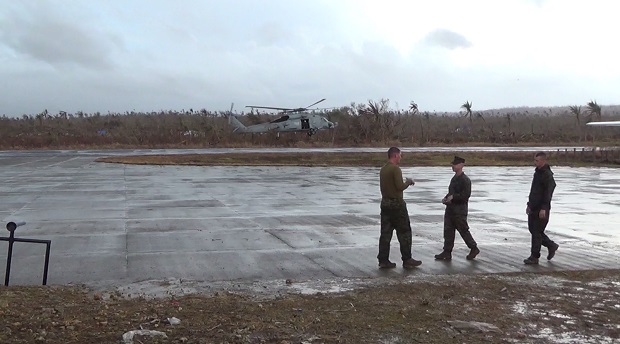MANILA, Philippines — The United States and Israel, two of several countries that helped in the relief operations after supertyphoon “Yolanda” (international name: Haiyan) wreaked havoc in Eastern Visayas, have pulled out their forces in the affected areas.
Captain Rafael Mariano, Director of Multi-National Coordinating Center, told reporters on Tuesday that there are no longer US and Israel forces in typhoon-hit areas as of Sunday.
He said that as high as 12,000 US forces helped in relief operations, while there were about 150 soldiers from Israel that were deployed here.
“The US was among the first responders here. Their unique capability to transport goods is really commendable. Without them, it would’ve taken a longer time,” Mariano said.
He added that the Philippines could have handled the situation without the US help but it would take a longer time to reach isolated areas.
“Their major role was they restored the runway. They installed a radar so planes could land at night,” Mariano said, referring to Tacloban City airport which was destroyed. In the immediate aftermath of the storm, planes couldn’t land at night.
The United Kingdom will also pull out its forces by next week, Mariano said.
He said the countries that still have their forces in the affected areas include the UK, Japan, Canada, Australia and Brunei.
He couldn’t say when the other foreign troops will start to pull out, but estimated that it could be not later than the middle of December.
Foreign aid also continued to pour in as Italy also sent three of its aircraft to help in the relief operations, while Korea is planning to send its engineers for reconstruction.
‘Balikatan 2014’
Even with the exit of US forces helping in the relief operations, the Philippines and US are doing a final site survey and final planning conference for the 2014 Balikatan Exercises.
The conference will be held at Fort Magsaysay in Nueva Ecija and at Dusit Thani in Makati on December 2 to 6 and December 9 to 13.
Army spokesman Captain Anthony Bacus said that these activities aim to finalize exercise dates, venue, exercise concept, logistical requirements and other details for next year.
The annual bilateral training is aimed at enhancing the interoperability of both countries.
RELATED STORIES:
Foreign aid workers carry out task under rain in Tacloban
Interpol forensic experts scheduled to fly to Tacloban
US Navy carrier arrives in Leyte Gulf
